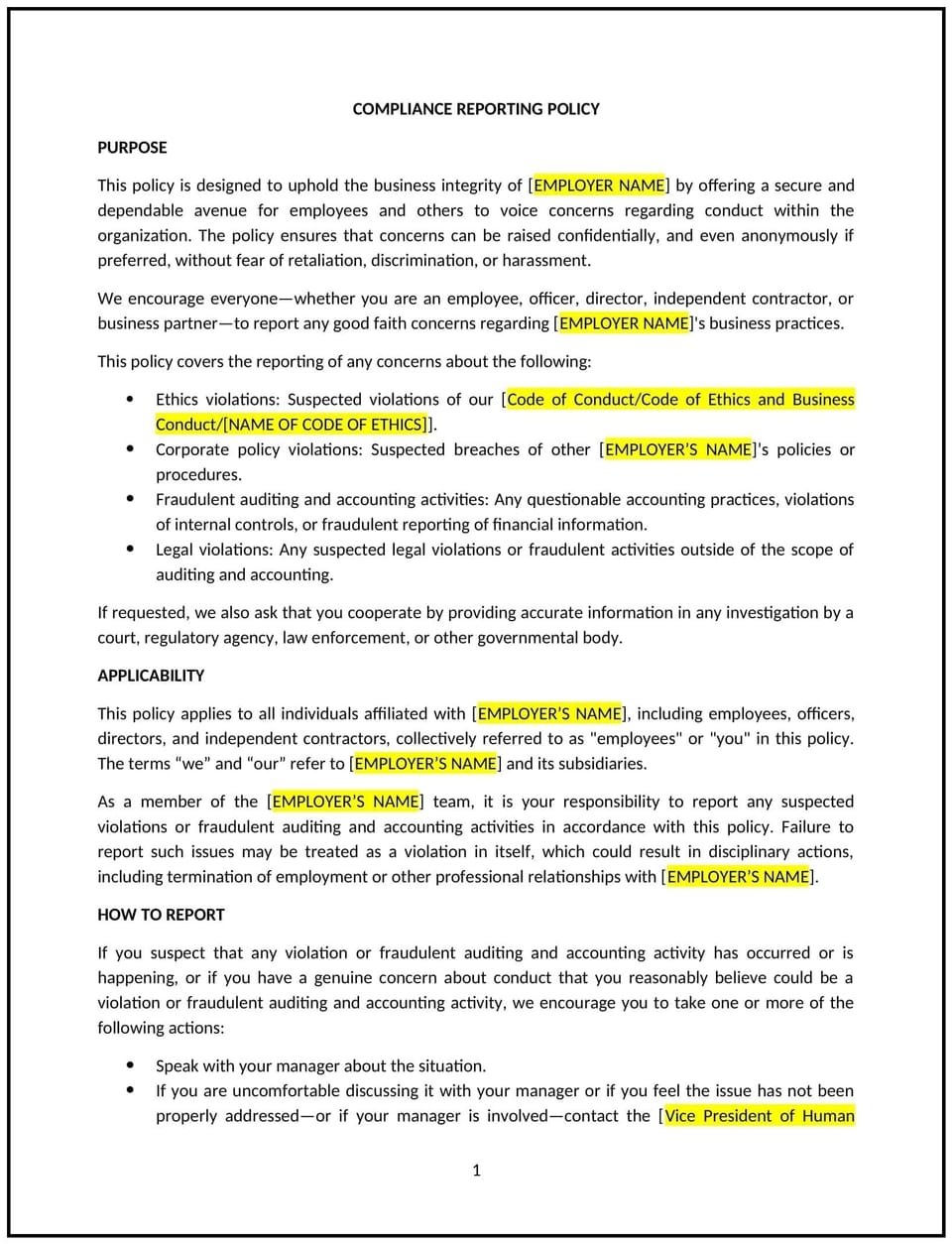Compliance reporting policy (Louisiana): Free template

Compliance reporting policy (Louisiana)
This compliance reporting policy is designed to help Louisiana businesses establish a clear framework for identifying, reporting, and addressing potential violations of laws, regulations, or internal policies. It outlines procedures to promote ethical conduct, accountability, and adherence to applicable requirements.
By implementing this policy, businesses can foster a culture of transparency and accountability while mitigating risks.
How to use this compliance reporting policy (Louisiana)
- Define reportable issues: Specify the types of concerns employees should report, such as fraud, safety violations, discrimination, or unethical conduct.
- Establish reporting channels: Provide employees with multiple reporting methods, such as confidential hotlines, email, or direct communication with supervisors or HR.
- Outline investigation procedures: Detail how reported concerns will be reviewed, investigated, and resolved in a timely manner.
- Include protections for whistleblowers: Assure employees that they will not face retaliation for reporting concerns in good faith.
- Assign roles and responsibilities: Clarify who is responsible for receiving, investigating, and resolving compliance-related reports.
- Communicate follow-up processes: Ensure employees understand how updates on reported issues will be communicated.
Benefits of using a compliance reporting policy (Louisiana)
Implementing this policy provides several advantages for Louisiana businesses:
- Promotes ethical conduct: Encourages employees to act responsibly and report potential violations.
- Reduces risks: Helps identify and address issues before they escalate into legal or operational problems.
- Builds trust: Demonstrates a commitment to transparency and accountability within the organization.
- Protects whistleblowers: Provides safeguards for employees who report concerns in good faith.
- Aligns with Louisiana-specific regulations: Reflects regional considerations for managing compliance-related matters.
Tips for using this compliance reporting policy (Louisiana)
- Provide anonymous reporting options: Allow employees to report concerns confidentially to encourage open communication.
- Train employees: Educate staff on recognizing compliance issues and using the reporting channels effectively.
- Monitor and review regularly: Evaluate the effectiveness of the reporting system and adjust it based on feedback or evolving needs.
- Communicate outcomes: Share resolution updates where appropriate to reinforce the organization’s commitment to addressing concerns.
- Ensure leadership support: Encourage management to promote the importance of the policy and lead by example.
Q: What types of issues should businesses address under this policy?
A: Businesses should address concerns such as fraud, harassment, discrimination, safety violations, or any actions that violate laws, regulations, or internal policies.
Q: How should businesses provide reporting channels?
A: Businesses can establish multiple channels, such as confidential hotlines, email, or in-person reporting, to ensure accessibility for all employees.
Q: What steps should businesses take after receiving a report?
A: Businesses should review the report promptly, conduct a thorough investigation, and resolve the issue while keeping the reporting employee informed where possible.
Q: How can businesses protect employees who report concerns?
A: Implement clear anti-retaliation measures, provide anonymity for reporters, and ensure that no adverse actions are taken against employees who report in good faith.
Q: Who is responsible for handling compliance reports?
A: Designated individuals, such as HR professionals or compliance officers, are typically tasked with receiving and investigating reports.
Q: How often should businesses review this policy?
A: The policy should be reviewed annually or when significant changes occur in Louisiana regulations or internal compliance requirements.
Q: How can businesses communicate the importance of compliance reporting?
A: Regular training, clear communication from leadership, and visible support for ethical practices can reinforce the importance of compliance reporting.
This article contains general legal information and does not contain legal advice. Cobrief is not a law firm or a substitute for an attorney or law firm. The law is complex and changes often. For legal advice, please ask a lawyer.


